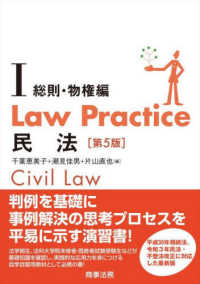- ホーム
- > 洋書
- > 英文書
- > Politics / International Relations
基本説明
New in paperback. Hardcover was published in 2004. Shows how backward policies restricting academic freedom have poisoned the intellectual climate of many academic institutions. Features studies of successful campus movements at the University of Pennsylvania, Columbia, Berkeley, and University of Wisconsin.
Full Description
This book addresses a major problem in contemporary American higher education: deprivations of free speech, due process, and other basic civil liberties in the name of favored political causes. Downs begins by analyzing the nature and evolution of the problem, and discusses how these betrayals of liberty have harmed the truth seeking mission of universities. Rather than promoting equal respect and tolerance of diversity, policies restricting academic freedom and civil liberty have proved divisive, and have compromised the robust exchange of ideas that is a necessary condition of a meaningful education. Drawing on personal experience as well as research, Downs presents four case studies that illustrate the difference that conscientious political resistance and mobilization of faculty and students can make. Such movements have brought about unexpected success in renewing the principles of free speech, academic freedom, and civil liberty at universities where they have been active.
Contents
Part I. Introduction and Background: 1. The return of the proprietary university and the new politics of free speech and civil liberty; 2. Background: the rise of anti-free speech and liberty ideologies; Part II. Case Studies in the Politics of Civil Liberty on Campus: 3. Columbia's sexual misconduct policy: civil liberty vs. solidarity; 4. Berkeley and the rise of the anti-free speech movement; 5. Undue process at Penn; 6. Renewal: the rise of the free speech movement at Wisconsin; 7. Abolition in the Wisconsin faculty senate and its aftermath; 8. Some conclusions concerning civil liberty and political strategy.







